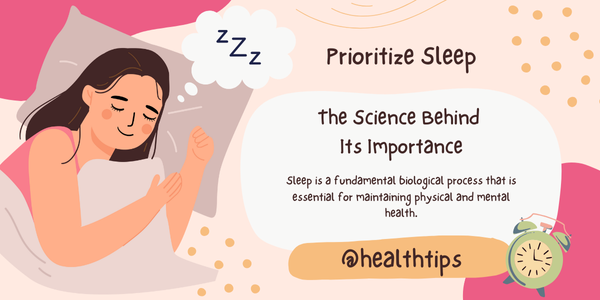Prioritize Sleep The Science Behind Its Importance
Sleep is a fundamental biological process that is essential for maintaining physical and mental health. Despite its significance, sleep is often neglected in modern society, leading to a range of health issues. This comprehensive article explores the scientific reasons why prioritizing sleep is crucial, supported by research evidence.

The Biological Necessity of Sleep
Sleep is a complex and dynamic state that involves multiple physiological processes. It is regulated by the circadian rhythm, an internal clock that cycles between sleepiness and alertness at regular intervals. The circadian rhythm is influenced by environmental cues such as light and temperature, which help synchronize our sleep-wake cycle with the external environment.
- Sleep Stages and Functions
Sleep is divided into two main types: Non-Rapid Eye Movement (NREM) sleep and Rapid Eye Movement (REM) sleep. NREM sleep consists of three stages, each with distinct functions:
- NREM Stage 1: The transition between wakefulness and sleep, characterized by light sleep and slowing of brain activity.
- NREM Stage 2: Deeper sleep where body temperature drops and heart rate slows. It accounts for about 50% of total sleep time.
- NREM Stage 3: Also known as slow-wave sleep (SWS) or deep sleep, it is crucial for physical restoration, immune function, and tissue repair.
REM sleep is characterized by rapid eye movements, increased brain activity, and vivid dreaming. It plays a vital role in cognitive functions such as memory consolidation, emotional regulation, and learning.
The Impact of Sleep on Physical Health
Prioritizing sleep has profound effects on physical health. Research has shown that inadequate sleep can lead to a range of health issues:
- Cardiovascular Health
Studies have demonstrated a strong link between sleep and cardiovascular health. A meta-analysis by Cappuccio et al. (2011) found that short sleep duration is associated with an increased risk of hypertension, coronary heart disease, and stroke. The mechanisms underlying this association include increased sympathetic nervous system activity, elevated cortisol levels, and inflammation.
- Metabolic Health and Weight Management
Sleep plays a critical role in metabolic regulation. Insufficient sleep has been linked to obesity and metabolic disorders. Research by Spiegel et al. (2004) found that sleep restriction alters glucose metabolism and increases appetite, leading to weight gain. Additionally, poor sleep affects hormones such as leptin and ghrelin, which regulate hunger and satiety.
- Immune Function
Adequate sleep is essential for a robust immune system. A study by Besedovsky et al. (2012) highlighted that sleep enhances the production of cytokines, proteins that regulate immune responses. Sleep deprivation, on the other hand, impairs immune function and increases susceptibility to infections.
- Hormonal Balance
Sleep influences the secretion of various hormones, including growth hormone, cortisol, and melatonin. Growth hormone, released during deep sleep, is vital for growth, tissue repair, and muscle development. Cortisol, a stress hormone, follows a circadian rhythm and peaks in the morning. Disruptions in sleep can lead to hormonal imbalances, affecting overall health.
The Cognitive and Emotional Benefits of Sleep
Beyond physical health, sleep is crucial for cognitive and emotional well-being. The brain undergoes various processes during sleep that enhance mental functions:
- Memory Consolidation
One of the most well-established functions of sleep is memory consolidation. During sleep, the brain processes and consolidates information acquired during the day. Research by Diekelmann and Born (2010) demonstrated that both NREM and REM sleep are involved in different types of memory processing. NREM sleep supports declarative memory (facts and events), while REM sleep enhances procedural memory (skills and tasks).
- Emotional Regulation
Sleep has a significant impact on emotional regulation. Studies have shown that sleep deprivation affects the amygdala, a brain region involved in emotional processing. A study by Yoo et al. (2007) found that sleep-deprived individuals exhibit heightened emotional reactivity and impaired emotional regulation. Adequate sleep helps maintain emotional stability and resilience.
- Cognitive Performance
Sleep is essential for optimal cognitive performance. Research has shown that sleep deprivation impairs attention, decision-making, and problem-solving abilities. A study by Lim and Dinges (2010) highlighted that even moderate sleep deprivation can lead to significant cognitive deficits. Conversely, prioritizing sleep enhances cognitive functions such as creativity, critical thinking, and executive functioning.
The Consequences of Sleep Deprivation
Chronic sleep deprivation has far-reaching consequences on health and well-being. Understanding these consequences underscores the importance of prioritizing sleep:
- Increased Risk of Chronic Diseases
Sleep deprivation is a risk factor for various chronic diseases. Research has linked inadequate sleep to conditions such as diabetes, hypertension, and cardiovascular diseases. The Nurses’ Health Study by Patel et al. (2006) found that women who slept less than five hours per night had a higher risk of developing coronary heart disease compared to those who slept seven to eight hours.
- Impaired Immune Function
As mentioned earlier, sleep is crucial for immune function. Chronic sleep deprivation weakens the immune system, making individuals more susceptible to infections and illnesses. A study by Cohen et al. (2009) found that individuals with shorter sleep durations were more likely to develop a cold after exposure to the rhinovirus.
- Mental Health Issues
Sleep deprivation is closely linked to mental health disorders such as depression and anxiety. A meta-analysis by Baglioni et al. (2011) found that insomnia is a significant risk factor for the development of depression. Additionally, poor sleep quality exacerbates symptoms of anxiety and affects overall psychological well-being.
- Impaired Physical Performance
Athletes and physically active individuals require adequate sleep for optimal performance. Sleep deprivation impairs physical performance by reducing reaction times, coordination, and endurance. A study by Mah et al. (2011) found that extended sleep improved performance, mood, and alertness in collegiate basketball players.
- Increased Mortality Risk
Chronic sleep deprivation has been associated with increased mortality risk. The Whitehall II study by Ferrie et al. (2007) found that individuals who consistently slept less than five hours per night had a higher risk of death from all causes compared to those who slept six to eight hours. This highlights the critical role of sleep in overall health and longevity.
Strategies to Prioritize Sleep
Understanding the importance of sleep is the first step toward prioritizing it. Implementing practical strategies can help improve sleep quality and duration:
- Establish a Consistent Sleep Schedule
Maintaining a regular sleep schedule helps regulate the circadian rhythm. Going to bed and waking up at the same time every day, even on weekends, reinforces the body’s natural sleep-wake cycle.
- Create a Sleep-Conducive Environment
The sleep environment plays a crucial role in sleep quality. Ensure the bedroom is dark, quiet, and cool. Consider using blackout curtains, earplugs, or white noise machines to eliminate disturbances. A comfortable mattress and pillows also contribute to better sleep.
- Limit Exposure to Blue Light
Exposure to blue light from screens (phones, tablets, computers) can interfere with the production of melatonin, a hormone that regulates sleep. Limit screen time before bed and consider using blue light filters or glasses to reduce exposure.
- Avoid Stimulants Before Bed
Caffeine and nicotine are stimulants that can disrupt sleep. Avoid consuming them in the hours leading up to bedtime. Opt for calming beverages such as herbal tea instead.
- Establish a Relaxing Bedtime Routine
A relaxing bedtime routine signals to the body that it’s time to wind down. Activities such as reading, taking a warm bath, or practicing mindfulness can promote relaxation and prepare the body for sleep.
- Exercise Regularly
Regular physical activity has been shown to improve sleep quality. However, avoid vigorous exercise close to bedtime, as it can have a stimulating effect. Aim for at least 30 minutes of moderate exercise most days of the week.
- Manage Stress
Stress is a significant barrier to good sleep. Practice stress management techniques such as meditation, deep breathing, or yoga to reduce stress levels and promote relaxation.
- Seek Professional Help
If sleep difficulties persist despite implementing these strategies, consider seeking professional help. A healthcare provider or sleep specialist can evaluate for underlying sleep disorders such as insomnia or sleep apnea and recommend appropriate treatments.
Conclusion
Prioritizing sleep is essential for maintaining physical and mental health. The scientific evidence underscores the myriad benefits of adequate sleep, from supporting cardiovascular health and immune function to enhancing cognitive abilities and emotional well-being. Understanding the consequences of sleep deprivation further highlights the critical role of sleep in overall health and longevity. By implementing practical strategies to improve sleep quality and duration, individuals can experience profound improvements in their quality of life. Embrace the power of sleep, and make it a priority for a healthier, more vibrant you.

